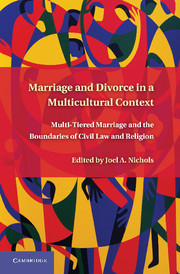 Marriage and Divorce in a Multi-Cultural Context
Marriage and Divorce in a Multi-Cultural Context Book contents
- Frontmatter
- Contents
- Detail Contents
- About the Editor
- List of Contributors
- Preface
- Permissions
- Introduction
- 1 Multi-Tiered Marriage
- 2 Pluralism and Decentralization in Marriage Regulation
- 3 Marriage and the Law
- 4 Unofficial Family Law
- 5 Covenant Marriage Laws
- 6 New York’s Regulation of Jewish Marriage
- 7 Political Liberalism, Islamic Family Law, and Family Law Pluralism
- 8 Multi-Tiered Marriages in South Africa
- 9 Ancient and Modern Boundary Crossings Between Personal Laws and Civil Law in Composite India
- 10 The Perils of Privatized Marriage
- 11 Canadian Conjugal Mosaic
- 12 Marriage Pluralism in the United States
- 13 Faith in Law? Diffusing Tensions Between Diversity and Equality
- 14 The Frontiers of Marital Pluralism
- Index
- References
6 - New York’s Regulation of Jewish Marriage
Covenant, Contract, or Statute?
Published online by Cambridge University Press: 05 November 2011
- Frontmatter
- Contents
- Detail Contents
- About the Editor
- List of Contributors
- Preface
- Permissions
- Introduction
- 1 Multi-Tiered Marriage
- 2 Pluralism and Decentralization in Marriage Regulation
- 3 Marriage and the Law
- 4 Unofficial Family Law
- 5 Covenant Marriage Laws
- 6 New York’s Regulation of Jewish Marriage
- 7 Political Liberalism, Islamic Family Law, and Family Law Pluralism
- 8 Multi-Tiered Marriages in South Africa
- 9 Ancient and Modern Boundary Crossings Between Personal Laws and Civil Law in Composite India
- 10 The Perils of Privatized Marriage
- 11 Canadian Conjugal Mosaic
- 12 Marriage Pluralism in the United States
- 13 Faith in Law? Diffusing Tensions Between Diversity and Equality
- 14 The Frontiers of Marital Pluralism
- Index
- References
Summary
Introduction
Is Jewish marriage and divorce law essentially covenantal or contractual? The answer to this ancient question – and the extent to which the answer is an amalgamation of the two choices – has changed over time. Different authorities have disagreed about this question in profound ways, and the answer is still in flux today.
On the one hand, Jewish tradition is replete with references to the sacred nature of the marital relationship. The Talmud recounts that a person is not complete until he or she marries, and he or she is not even called a person until two are united. Further, the classical sources recount the profound Divine hand in the creation of marriage. One Talmudic source goes so far as to state, “Forty days prior to birth, the Holy One, Blessed be He, announces that so-and-so should marry so-and-so.” Marriages appear to be holy relationships that embrace and are embraced by the Divine. For example, the earliest commentaries on the Bible posit that God performed the wedding ceremony between Adam and Eve. Indeed, the blessings recited at Jewish weddings recount that it is God who “commanded us with regard to forbidden relationships, forbade [merely] betrothed women to us, and permitted wives [to husbands] through the Jewish wedding ceremony.”
- Type
- Chapter
- Information
- Marriage and Divorce in a Multi-Cultural ContextMulti-Tiered Marriage and the Boundaries of Civil Law and Religion, pp. 138 - 163Publisher: Cambridge University PressPrint publication year: 2011
References
- 1
- Cited by


